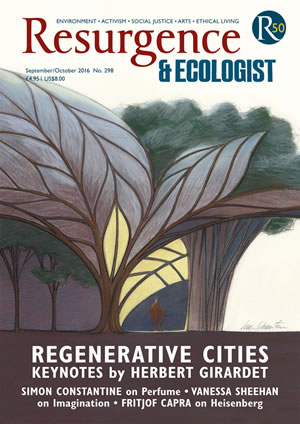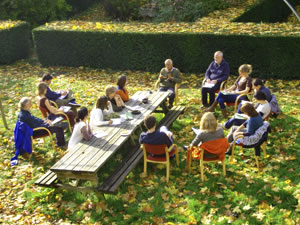When in 1990 we were dreaming about establishing Schumacher College at Dartington in Devon, people said, “Your vision is too idealistic. Who is going to come to learn about ecology or spirituality or holistic philosophy and pay for it?” Many thought that Schumacher College might last two or three years and then fold. Now it is heartening and gratifying to see that after 25 years not only is the college still here, but it is blossoming and flourishing.
The raison d’être behind Schumacher College was and still is very simple. Modern industrial society is promoted and held by the mainstream educational system. The universities are the backbone of this society. Many young people are conditioned to think in an economic and materialistic way. Many are taught to think that Nature is there for us to use and exploit: that we humans are the superior species and we can do to Nature what we like. When students who have been taught this way come out of universities they often exploit Nature and exploit other people in order to make their own lives rich, comfortable and successful. Social injustice and ecological injustice merge.
We needed to challenge and change that. We could do it in many ways. We could speak about it, we could write books about it. But that’s not enough. We have to start something that shows that another way is possible. We don’t have to condition our young people’s minds to exploit people or exploit Nature. We have to teach that we are Nature. We have to live in harmony with the rest of Nature. Schumacher College was established to do just that. It is not only an intellectual place to teach ecology, but also a place where students can experience an ecological lifestyle.
The word ‘eco’ means ‘home’ – ‘planet home’ as well as your ‘personal home’. So not only is Schumacher College a place to teach ecology, but it is also a home in itself. That’s the design of Schumacher College. People who come here should feel at home. This is their home. They cook here, they garden here, they clean their rooms. The college is not an institution. If you go to university, you have a blackboard on the wall, you have a screen on your desk and there’s a teacher by whom you are taught. Then you go back to your apartment or dormitory and you live there. There is no connection between learning and living. In our vision, living and learning should be an integral part of each other. What you are learning should be integral to your living. This is the vision of a holistic education and an eco-logical college.
Also, we at Schumacher College are members of a community: a human community as well as an Earth community. If we live in harmony with Nature, with people, with all of our surroundings, then we develop a sense of community. We learn to respect each other, help each other and support each other. So home and community are the practical models for this college.
In addition to ecology, we teach holistic science, holistic economics, holistic philosophy and how all the subjects are interrelated and interconnected. Ecology is connected with anthropology, anthropology is connected with psychology, and psychology is connected with gardening and agriculture. Here at Schumacher College, even if you are studying a particular subject you are doing so in the context of a bigger picture. Thus integrated learning and living is the essence of Schumacher College. Here the students are transformed because they have gone through an experience of holistic living. Having transformed themselves, they go out in the world and find a way of transforming the world. They help the world to be a better place, a place where we minimise the exploitation of people and Nature.
What characterises learning here is that teacher and student are in partnership. Students are not just consuming knowledge: they are exploring and developing together with their teachers.
They’re partners in exploring and learning together. It’s a kind of journey. The students are here for discovering themselves. Teachers are helpful to students in discovering what’s already there. It’s knowledge from the inside out, not from the outside in. Teachers are here to inspire, to ignite, to light the students’ inner candle. The light of the candle is inside the candle. That’s a unique quality of Schumacher College.
Nature is also our teacher, as much as human teachers like James Lovelock or Stephan Harding or Vandana Shiva or anybody else. Every week, at least once a week, students go to Dartmoor, go to the sea, or go to be among the trees in the forest to learn and to experience Nature.
Schumacher College has accomplished more than I expected. In 25 years, thousands of students have come. We have 17,000 on our alumni list. They learn, transform, go out in the world and become agents of change. A dream has really come true. I see students blossoming, flourishing, enjoying, celebrating and learning. I go to many universities. I find students there feel that they have to study because they have to pass the exams in order to get a good job. But they are not so happy with their lives. At Schumacher College, students enjoy every day of learning, every day of being, because exam results do not dominate here.
Schumacher College should remain small. But more Schumacher College-type centres should emerge in other countries: Australia, New Zealand, India, America, European and African countries… They don’t have to be called Schumacher College. It’s not a franchise. We want people to take their own initiative, based in the culture and ethos of their own country and language, but incorporate the spirit of Schumacher College. How that spirit is manifested doesn’t matter. Whatever the name, as long as it’s holistic and people are learning to serve the community, serve the society and serve the Earth, it is Schumacher College. I want to see new centres of education starting around the world and forming an informal network to support each other.
I often say to Schumacher students who go out into the world with confidence, don’t look for a job but create a livelihood. There’s a difference between having a job and having a livelihood. A job is something we do for money, whether we like it or not. Livelihood is where we find something we really want to do and we find fulfilment in doing it. Being paid for it is a by-product. Of course we need money, but we are not working for money. I want Schumacher College students to go out into the world and work for something greater: work with imagination, work in the service of the Earth, and work for the values and ideals they hold dear in their hearts. To bring their profession and their vocation together. At the moment, many people have a vocation for the weekends, when they do poetry or art or gardening, do something they enjoy doing, but during the weekdays they are in a profession. Their work is something they do just to earn money. I want this separation of vocation and profession to be healed. Students must do what is their vocation and do it professionally. By combining the two, you transform your job into a livelihood.
The college celebrates its 25th anniversary on 27 September in Totnes. For further information about the event and a course programme visit www.schumachercollege.org.uk








